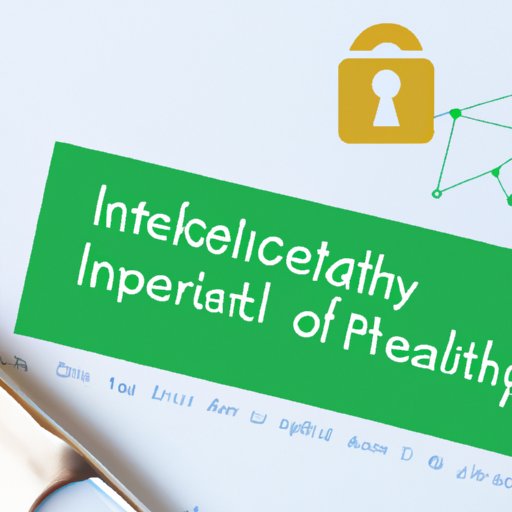
Introduction
Interoperability in healthcare is becoming increasingly important as patients interact with a growing network of healthcare providers. It’s critical to understand the concept of interoperability to ensure that different healthcare systems can work together seamlessly to improve patient outcomes.
In this article, we’ll explore what interoperability is in healthcare and why it matters. We’ll also discuss the various challenges associated with achieving interoperability, the solutions to these challenges, and best practices for successful implementation.
Breaking Down the Meaning of Interoperability in Healthcare: The Ultimate Guide
Interoperability refers to the ability of different healthcare systems to communicate and exchange information with each other in a seamless and efficient way. It enables healthcare providers to access and analyze patient data from various sources and systems, which is essential for providing effective care.
There are several types of healthcare data that need to be interoperable, including clinical, medical imaging, and administrative data. Clinical data, for example, includes vital signs, lab reports, diagnoses, and prescriptions, while medical imaging data includes X-rays, MRIs, and ultrasounds.
The importance of interoperability in healthcare is vast. It enables providers to have a complete view of a patient’s medical history and care journey, allowing for better care coordination and improved patient outcomes.
Interoperability in Healthcare: How it Ensures Seamless Patient Care
The impact of interoperability on seamless patient care cannot be overstated. It ensures that healthcare providers have access to a patient’s complete medical history, including any medication allergies or chronic conditions, which is essential for providing accurate diagnoses and appropriate treatment plans.
Interoperability also improves continuity of care by ensuring that patients receive consistent and coordinated care across different healthcare settings. For example, if a patient visits a specialist, such as a cardiologist, the specialist can access the patient’s complete medical history and care plan to provide more informed care.
Navigating Interoperability in Healthcare: Challenges and Solutions
Several factors can hinder interoperability in healthcare, including technical, financial, and regulatory challenges.
One of the most significant technical barriers to interoperability is the lack of standardization in healthcare systems. Different systems may use different codes, languages, and formats to describe medical information, making it challenging to exchange data between them.
Financial challenges associated with implementing interoperability can also be significant. Small or rural healthcare providers may lack the financial resources required to invest in the necessary technology and infrastructure to achieve interoperability.
Regulatory challenges, such as privacy and security concerns, can also pose obstacles to interoperability. To mitigate these concerns, healthcare providers must ensure that they comply with relevant regulations, such as HIPAA and GDPR.
Despite these challenges, there are several solutions to promote interoperability in healthcare, such as the adoption of common data standards and the implementation of secure data exchange protocols. Healthcare providers can also invest in electronic health record systems that are built to be interoperable.
The Future of Healthcare: The Role of Interoperability in Improving Patient Outcomes
The future of healthcare is bright, with interoperability playing a central role in driving innovation to improve patient outcomes. Interoperability has the potential to facilitate the development of precision medicine, which would allow providers to offer personalized treatments based on a patient’s unique genetic makeup.
Moreover, interoperability can help prevent medical errors and reduce healthcare costs by enabling healthcare providers to make informed decisions based on complete patient data. It also has the potential to improve patient engagement, as patients can be empowered to access and manage their health information in real-time.
Achieving Interoperability in Healthcare: Tips and Best Practices
Successfully implementing interoperability in healthcare requires attention to detail and adherence to best practices. Some tips to ensure successful interoperability include:
- Invest in appropriate technology and infrastructure to support interoperability
- Adopt common data standards
- Ensure compliance with relevant regulations
- Conduct thorough testing of data exchange protocols before implementation
- Regularly monitor and update interoperability practices to ensure they are meeting the needs of patients and providers
Moreover, healthcare organizations must prioritize privacy and security concerns when implementing interoperability. Patients must have control over their health information and consent to its use for specific purposes.
The Importance of Interoperability in Healthcare: How it Enhances Medical Research
Interoperability in healthcare also has far-reaching implications for medical research. Interoperability enables researchers to access large datasets of consistent and reliable healthcare information, which is critical for conducting meaningful studies and making significant advancements in medicine.
Several research studies have been facilitated by interoperability in recent years. For example, the National Institutes of Health’s (NIH) “All of Us” program is a research initiative that aims to gather health data from one million people to improve medical research and treatments. Interoperability is an essential component of this program, as it enables researchers to access and use the data collected effectively.
Consistent and reliable healthcare data is critical for achieving breakthroughs in medical research, and interoperability is the key to unlocking its full potential.

Interoperability in Healthcare: The Key to Unlocking the Potential of Health Data
Interoperability in healthcare is the key to unlocking the full potential of health data. It enables healthcare providers to access and analyze patient information in real-time, which is essential for providing personalized care and improving patient outcomes.
Interoperability also enables healthcare providers to make informed decisions based on complete patient data, which can help prevent medical errors, reduce healthcare costs, and improve patient engagement.
Interoperability in healthcare policy and legislation is increasingly becoming a topic of discussion. Many healthcare providers and policymakers are calling for increased efforts to promote interoperability in healthcare, as it has the potential to transform the industry and provide significant benefits to patients and providers alike.
Conclusion
Interoperability in healthcare is a crucial aspect of modern medical practice that is essential for improving patient outcomes and advancing medical research. While there are significant challenges associated with achieving interoperability, solutions exist, and healthcare organizations must prioritize interoperability in their operations.
By investing in appropriate technology and infrastructure, adopting common data standards, and prioritizing privacy and security concerns, healthcare providers can work together seamlessly to deliver the best possible care to patients.
Let’s prioritize interoperability in healthcare and empower providers to work together toward the common goal of achieving better patient outcomes.




